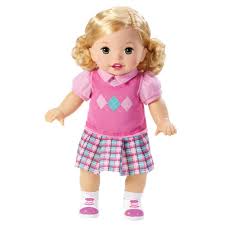doll
英 [dɒl]
美 [dɑːl]
- n. 洋娃娃;玩偶;无头脑的美丽女人
- vt. 把…打扮得花枝招展
- n. (Doll)人名;(英)多尔(女子教名Dorothea和Dorothy的昵称);(西)多利
使用频率:

记忆方法
记忆单词“doll”的一个简单方法是将其与“D”字母和“ Oliver”这个名字联系起来。想象一个“D”字形的娃娃,或者一个名叫“Oliver”的小男孩有一个玩具娃娃。这样,通过视觉形象和故事化的联想,可以更容易地记住“doll”这个单词。
以上内容由AI生成, 仅供参考和借鉴
中文词源
doll 玩偶
来自Dorothy的昵称,用来指玩偶。比较Teddy Bear.
英语词源
- doll
-
doll: [16] Doll comes from the name Dorothy: the changing of r to l in personal names is a common English phenomenon of long standing, from Shakespeare’s Prince Hal (for Harry) to the currently familiar Del and Tel (for Derek and Terry). The word was originally applied to a man’s mistress (much like moll, which came from Mary), but in the 18th century it came to be applied to a ‘toy baby’. The pet form dolly dates from the 17th century.
- doll (n.)
- 1550s, endearing name for a female pet or a mistress; originally a familiar form of fem. proper name Dorothy (q.v.). The -l- for -r- substitution in nicknames is common in English: compare Hal for Harold, Moll for Mary, Sally for Sarah, etc. Attested from 1640s as colloquial for "slattern;" sense of "child's toy baby" is c. 1700. Transferred back to living beings 1778 in sense of "pretty, silly woman."
- doll (v.)
- 1867, "to pet, indulge," from doll (n.). Usually with up. Meaning "to dress up" is from 1906, American English. Related: Dolled; dolling.
权威例句
- 1. The doll-like figures in these stories are unlike anybody, let alone oneself.
- 这些故事中的玩偶形象跟谁都不像,更不用说像自己了。
- 2. "Yes, Mum," replied Cheryl as she slowly put away her doll.
- “是的,妈妈。”谢里尔一边慢慢地收起布娃娃一边回答。
- 3. It's a vinyl doll with movable arms and legs.
- 这是一个四肢可以活动的乙烯基塑料玩具娃娃。
- 4. We used to doll ourselves up and go into town.
- 我们那时常常打扮得漂漂亮亮然后进城去。
- 5. a doll with a movable head
- 头可活动的洋娃娃